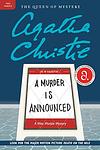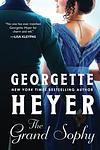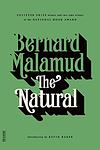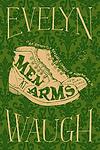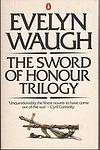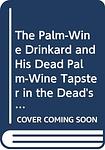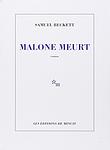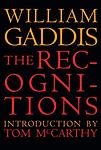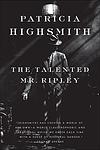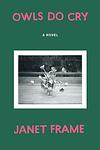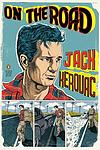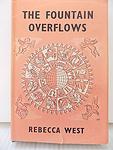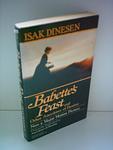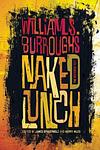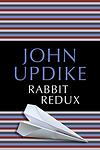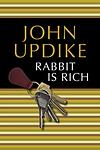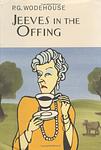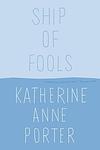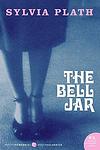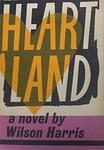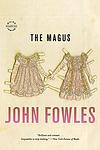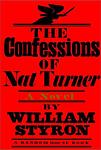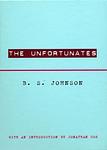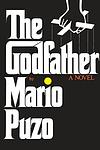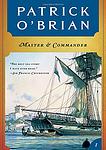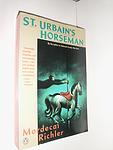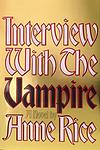The Modern Library: The Two Hundred Best Novels in English Since 1950
This is one of the 284 lists we use to generate our main The Greatest Books list.
-
A Murder Is Announced by Agatha Christie
In a quaint English village, the residents are intrigued by a newspaper advertisement announcing a murder at a local house at a specific time. When the time comes, a deadly game unfolds, resulting in a real murder. The village is thrown into a state of confusion and suspicion, prompting the arrival of a shrewd elderly detective who begins to unravel a complex web of secrets and lies. Through meticulous investigation and an understanding of human nature, the detective exposes the intricate plot behind the murder, revealing the identity of the cunning culprit and the motives that led to the crime.
-
Nothing by Henry Green
The novel explores the intertwined lives of a group of affluent, idle Londoners between the World Wars, focusing on the adulterous affairs and complex relationships within their circle. As the characters navigate love, boredom, and the search for meaning in their privileged existence, the narrative delves into the nuances of communication and the subtleties of social interaction. The story unfolds through a series of conversations and encounters, revealing the characters' inner lives and the emptiness that pervades their world of leisure and luxury.
-
Power Without Glory by Frank Hardy
This novel is a gritty and controversial tale set in early 20th-century Australia, chronicling the life of a ruthless and ambitious man who rises from working-class origins to become a powerful figure in the political and business arenas. Through a combination of cunning, blackmail, and corruption, he amasses wealth and influence, all while maintaining a facade of respectability. His unscrupulous dealings and personal indiscretions, however, lead to a tumultuous private life and eventually draw the scrutiny of his enemies. The story serves as a critique of the corrupting nature of power and the moral compromises one may make in the pursuit of glory.
-
The Grand Sophy by Georgette Heyer
The novel is a sparkling Regency romance that follows the vivacious and resourceful Sophy Stanton-Lacy, who is sent to stay with her aunt's family in London. Upon arrival, Sophy quickly upends the household's rigid conventions and matchmaking schemes with her unconventional ways and bold demeanor. With a keen wit and a knack for solving other people's problems, she navigates through a series of comedic entanglements, ultimately steering her cousins towards suitable matches and even finding love herself. Her charm and confidence challenge the staid manners of high society, leading to delightful chaos and unexpected resolutions.
-
December Bride by Sam Hanna Bell
"December Bride" is a poignant and captivating novel set in rural Northern Ireland during the early 20th century. The story follows the life of a young woman named Sarah, who finds herself caught between tradition and her own desires. As she navigates the complexities of love, family, and societal expectations, Sarah must make difficult choices that will shape her future. With its vivid descriptions and richly drawn characters, this book explores themes of identity, sacrifice, and the enduring power of love.
-
My Cousin Rachel by Daphne du Maurier
The novel revolves around a young Englishman who seeks the truth about his cousin's mysterious widow, suspecting her of foul play in his cousin's untimely death. As he becomes entangled in the widow's seductive charms, his initial suspicions transform into a complex blend of attraction, jealousy, and uncertainty. Set against the backdrop of a grand Cornish estate, the story delves into themes of obsession, inheritance, and the blurred lines between passion and poison, leaving readers to ponder the true nature of the enigmatic woman at its center.
-
The West Pier by Patrick Hamilton
The novel revolves around the life of Ernest Ralph Gorse, a charming but amoral conman in 1930s England, who preys on the emotions and finances of vulnerable women. Set against the backdrop of the seedy underbelly of Brighton, the story follows Gorse as he embarks on a series of manipulative and deceitful relationships, using his wit and charisma to swindle his victims out of their money. The West Pier serves as a metaphor for the decay and moral decline that Gorse embodies, and the narrative delves into the psychological aspects of his character, exploring the themes of deception, betrayal, and the darker side of human nature.
-
The Ballad of the Sad Cafe by Carson McCullers
Set in a small, desolate Southern town, the book tells the story of Miss Amelia, a lonesome and eccentric woman who operates a café. Her life takes a turn when her estranged husband, Marvin Macy, a brutal man, and Cousin Lymon, a hunchbacked dwarf who she falls in love with, come to town. The book explores themes of love, loneliness, and isolation, as Miss Amelia's love for Cousin Lymon leads to her downfall and the café's closure.
-
A Dance to the Music of Time by Anthony Powell
"A Dance to the Music of Time" is a twelve-volume cycle that follows the life of the protagonist, a man from the upper-middle class in England, from his school days to his old age. The series provides a detailed and satirical depiction of British society and its changes over several decades, from the 1920s to the 1970s. The narrative is filled with a rich cast of characters from different social classes and backgrounds, whose lives intersect in various ways over time.
-
The Catcher in the Rye by J. D. Salinger
The novel follows the story of a teenager named Holden Caulfield, who has just been expelled from his prep school. The narrative unfolds over the course of three days, during which Holden experiences various forms of alienation and his mental state continues to unravel. He criticizes the adult world as "phony" and struggles with his own transition into adulthood. The book is a profound exploration of teenage rebellion, alienation, and the loss of innocence.
-
Invisible Man by Ralph Ellison
The novel is a poignant exploration of a young African-American man's journey through life, where he grapples with issues of race, identity, and individuality in mid-20th-century America. The protagonist, who remains unnamed throughout the story, considers himself socially invisible due to his race. The narrative follows his experiences from the South to the North, from being a student to a worker, and his involvement in the Brotherhood, a political organization. The book is a profound critique of societal norms and racial prejudice, highlighting the protagonist's struggle to assert his identity in a world that refuses to see him.
-
The Old Man and the Sea by Ernest Hemingway
An aging Cuban fisherman struggles with a giant marlin far out in the Gulf Stream, isolated from the world and from human help. For days, he fights the marlin alone, admiring its strength, dignity, and faithfulness to its identity—its destiny is as true as his as a fisherman. He finally kills the marlin, but sharks attack and devour it before he can return to the shore. The fisherman returns home empty-handed but remains undefeated, having proven his abilities to himself.
-
The Natural by Bernard Malamud
The book tells the story of a baseball prodigy named Roy Hobbs, whose career is almost ended when a mysterious woman shoots him. After years of recovery, he returns to the game as a middle-aged rookie and leads his team to the top of the league. However, his past mistakes and personal flaws lead to his downfall. The novel explores themes of heroism, fate, and the American Dream.
-
The Financial Expert by R. K. Narayan
The novel follows the life of Margayya, a shrewd and ambitious financial advisor in a small South Indian town, who starts his career under a banyan tree offering advice to the local people on financial matters. With his cunning mind and understanding of the banking system, he rises to wealth and prominence, helping people with loans and investment schemes. However, his success is marred by his morally questionable methods and the eventual downfall that results from his hubris and detachment from traditional values. The story is a reflection on the complexities of financial dealings and the impact of modern capitalism on traditional Indian society, exploring themes of ambition, greed, and the consequences of a life devoted to the pursuit of money.
-
Wise Blood by Flannery O'Connor
"Wise Blood" is a novel about a young man named Hazel Motes, who returns home to Tennessee after serving in World War II and finds his religious beliefs shaken. He becomes a street preacher, founding the Church Without Christ to preach his message of faithlessness. The book explores themes of redemption, faith, and the struggle between belief and atheism as Hazel interacts with a variety of eccentric characters and faces his own internal battles.
-
East of Eden by John Steinbeck
This novel is a multi-generational epic that follows the lives of the Trask and Hamilton families in the Salinas Valley in California. The story is deeply rooted in biblical allegory, particularly the tale of Cain and Abel, as it explores themes of love, guilt, freedom, and the inherent good and evil in human nature. The narrative provides a profound, complex portrayal of family and individual struggles with morality and love, while also reflecting on the social changes affecting America during the late 19th and early 20th centuries.
-
Men At Arms by Evelyn Waugh
"Men At Arms" is a satirical novel set during World War II, following the misadventures of a group of British soldiers. The story revolves around the absurdities and incompetence within the military hierarchy, as well as the clash between the old-fashioned traditions and the modern realities of war. Through dark humor and witty dialogue, the book explores themes of heroism, loyalty, and the futility of war, painting a vivid picture of the chaotic and often farcical nature of armed conflict.
-
Officers And Gentlemen by Evelyn Waugh
The novel is a satirical war drama that follows the experiences of a young British officer during World War II. As part of the fictionalized Hookforce, he is involved in the chaotic retreat from Crete after the German invasion. The narrative weaves through the absurdities and tragedies of war, exposing the disjunction between the romanticized image of military life and the often grim reality. The protagonist navigates the incompetence of command, the camaraderie among soldiers, and the personal struggles that define life on the front, all while maintaining a veneer of the gentlemanly conduct expected of officers in the British Army.
-
Unconditional Surrender by Evelyn Waugh
"Unconditional Surrender" is the third novel in a trilogy that satirically chronicles the adventures of its protagonist, a young British man, through the tumultuous years of World War II. In this final installment, the protagonist finds himself navigating the complexities of military bureaucracy, engaging in various escapades across Europe, and grappling with personal and ethical dilemmas. The narrative weaves together themes of honor, absurdity, and the search for meaning amidst the chaos of war, all while maintaining a sharp, ironic wit that critiques the societal and military structures of the time.
-
Private Life Of An Indian Prince by Mulk Raj Anand
The novel delves into the tumultuous period of India's transition from British colonial rule to independence, focusing on the decline of a fictional princely state. The protagonist, a deposed Indian prince, grapples with the loss of his power and identity in the wake of the country's political upheaval. As he struggles to come to terms with his diminished status and the changing social order, the prince's personal turmoil reflects the broader existential crisis faced by Indian royalty during this era of monumental change. The narrative explores themes of tradition versus modernity, the impact of colonialism, and the search for self in a rapidly evolving world.
-
Go Tell it on the Mountain by James Baldwin
This novel explores the role of the Christian Church in the lives of African-Americans, both as a source of repression and moral hypocrisy and as a source of inspiration and community. It also, more broadly, examines the role of the Pentecostal Church in the African American experience. The narrative focuses on a fourteen-year-old boy's struggle to discover his identity amidst a family filled with secrets and a life marked by a religious community's strict moral code.
-
The Adventures of Augie March by Saul Bellow
"The Adventures of Augie March" is a novel set in Chicago during the Great Depression. The story follows the life of Augie March, a poor but spirited boy growing up in a broken home, as he navigates his way through life. The narrative explores his various jobs, relationships, and adventures, as he constantly seeks his identity and place in the world. His journey is marked by a series of encounters with different people and experiences, each shaping him in unique ways.
-
The Long Goodbye: A Novel by Raymond Chandler
This novel follows the story of a hard-boiled detective in Los Angeles who becomes embroiled in a complex case when he befriends a drunk named Terry Lennox. After Lennox's wife is found dead, Lennox disappears to Mexico and the detective is left to unravel the mystery. The detective then takes on another case of a missing husband, which becomes intertwined with the Lennox case, leading to a web of deceit, corruption, and murder. The detective's pursuit of the truth leads him through a gritty and corrupt world, testing his resolve and morality.
-
The Go-Between by L. P. Hartley
Set in the summer of 1900, the novel follows a young boy who visits a friend's family estate and becomes an unwitting messenger in an illicit affair between his friend's older sister and a local farmer. As the boy navigates the complexities of the adult world and the rigid class system of the time, he experiences a loss of innocence that has lasting effects on his life. The narrative explores themes of nostalgia, memory, and the corrupting power of class and wealth.
-
The Echoing Grove by Rosamond Lehmann
The novel delves into the complex emotional landscape of two sisters, Madeleine and Dinah, whose lives are entwined by love, betrayal, and a shared affection for the same man, Rickie. Set against the backdrop of England from the 1930s to the post-war era, the narrative explores the depths of their relationships, the pain of infidelity, and the impact of personal loss. As the story unfolds, it reveals the inner turmoil and evolving dynamics between the characters, offering a poignant examination of the human heart and the enduring consequences of passion and choice.
-
The Palm Wine Drinkard And His Dead Palm Wine Tapster In The Dead's Town by Amos Tutuola
This novel follows the surreal and fantastical journey of an African man with an insatiable thirst for palm wine, who, after the death of his skilled tapster, embarks on a quest to the land of the dead in hopes of bringing him back to the world of the living. Along the way, he encounters a myriad of bizarre and supernatural obstacles, including ghosts, witches, and other mythical creatures, each presenting their own challenges and moral lessons. The narrative, rich with the oral tradition of Nigerian folklore and written in a distinctive pidgin English, weaves a tale that explores themes of desire, loss, and the intersection of the living and the spiritual realms.
-
Lucky Jim by Kingsley Amis
"Lucky Jim" is a comic novel that follows the life of Jim Dixon, a young and disillusioned lecturer at a provincial British university. Struggling with his job and his pretentious boss, Dixon navigates through a series of humorous and often absurd situations, including a disastrous public lecture and a chaotic weekend at his boss's house. The novel satirizes the snobbishness and hypocrisy of the academic world, and explores themes of class, ambition, and the struggle to find personal authenticity in a conformist society.
-
Lord of the Flies by William Golding
A group of British boys are stranded on an uninhabited island after their plane crashes during wartime. Initially, they attempt to establish order, creating rules and electing a leader. However, as time passes, their civility erodes, and they descend into savagery and chaos. The struggle for power intensifies, leading to violence and death. The novel explores themes of innocence, the inherent evil in mankind, and the thin veneer of civilization.
-
The Tortoise And The Hare by Elizabeth Jenkins
In this insightful social commentary set in the interwar years of England, the novel explores the dynamics of a mismatched marriage between Imogen Gresham, a beautiful, innocent woman, and her husband Evelyn, a charming but cruel man. The narrative delves into the emotional and psychological impact of their relationship, particularly as it deteriorates under the strain of Evelyn's infidelity and emotional abuse. The arrival of a seemingly unremarkable governess, who is likened to a tortoise, sets the stage for a subtle yet profound upheaval within the household, challenging the established social order and the characters' understanding of success and happiness.
-
The Flint Anchor by Sylvia Townsend Warner
The novel is a historical family saga set in the 19th century, revolving around the Barnard family, whose patriarch, John Barnard, is a stern and pious man who rules his family with an iron fist. As the story unfolds, the narrative delves into the lives of the Barnard family members, exploring themes of duty, rebellion, and the quest for personal freedom. The characters grapple with the constraints of their social roles and the expectations placed upon them, leading to a rich tapestry of interpersonal dynamics and generational conflicts. The novel paints a vivid portrait of Victorian society, with its rigid moral codes and the undercurrents of change that challenge the status quo.
-
Molloy by Samuel Beckett
"Molloy" is a complex and enigmatic novel that follows the journey of its eponymous character, an elderly, disabled vagabond, who is tasked with finding and killing a certain person. The narrative is split into two parts: the first is told from Molloy's perspective as he navigates his way through a strange and often hostile world, while the second follows a detective named Moran who is assigned to find Molloy. The novel is renowned for its challenging narrative structure, its bleak and absurdist humor, and its profound exploration of themes such as identity, existence, and the human condition.
-
Malone Dies by Samuel Beckett
"Malone Dies" is a narrative that delves into the mind of an elderly man who lies in a decrepit room, slowly dying. Throughout the novel, the protagonist grapples with his impending demise, while reflecting on his past. He also creates characters and stories within his mind to cope with his solitude and despair. The novel, characterized by its stream-of-consciousness style and bleak outlook, is a profound exploration of the human condition, mortality, and the nature of existence.
-
The Unnamable by Samuel Beckett
"The Unnamable" is a complex, stream-of-consciousness narrative that explores themes of existence, identity, and the nature of reality. The protagonist, who lacks a clear identity, is trapped in a void and continually questions his existence and reality. As he grapples with his own consciousness, he attempts to tell his story, but constantly doubts and revises it, creating a cyclical, fragmented narrative. The novel is known for its challenging, abstract prose and its exploration of existentialist themes.
-
The Recognitions by William Gaddis
The novel is a complex and lengthy examination of authenticity and forgery. It tells the story of a young man who becomes a master forger of Old Masters paintings, while exploring themes of identity, religion, and art. As the plot unfolds, the protagonist grapples with his own authenticity in a world obsessed with appearances and material success. The narrative is interspersed with philosophical and religious discussions, making it a challenging yet thought-provoking read.
-
The Talented Mr. Ripley by Patricia Highsmith
The Talented Mr. Ripley is a psychological thriller that follows the story of Tom Ripley, a young man struggling to make ends meet in New York City. When a wealthy shipbuilder mistakes Tom for a close friend of his son, Dickie Greenleaf, he offers him an all-expenses-paid trip to Italy to persuade his wayward son to return home. Instead, Tom becomes obsessed with the luxurious lifestyle of Dickie and his girlfriend, Marge, and goes to extreme lengths to make it his own, including identity theft and murder.
-
Lolita by Vladimir Nabokov
The novel tells the story of Humbert Humbert, a man with a disturbing obsession for young girls, or "nymphets" as he calls them. His obsession leads him to engage in a manipulative and destructive relationship with his 12-year-old stepdaughter, Lolita. The narrative is a controversial exploration of manipulation, obsession, and unreliable narration, as Humbert attempts to justify his actions and feelings throughout the story.
-
A Legacy by Sybille Bedford
"A Legacy" is a historical novel that captures the social and political turmoil of early 20th century Germany through the eyes of its protagonist. The story follows a young woman who hails from two distinct families, one being a wealthy Jewish family from Berlin and the other, an aristocratic Catholic family from rural Germany. The narrative provides a detailed account of the protagonist's life, her family's eccentricities, and the eventual downfall of her families amidst the backdrop of the First World War and the Weimar Republic.
-
Train To Pakistan by Khushwant Singh
Set against the backdrop of the Partition of India in 1947, the novel delves into the tumultuous events that unfold in the border village of Mano Majra, where Sikhs and Muslims have coexisted peacefully for generations. As the country is cleaved into India and Pakistan, the once tranquil village is thrown into chaos by the arrival of a train filled with the corpses of Sikhs and Hindus, escalating communal tensions. The narrative follows the lives of several characters, including a young Sikh boy and a Muslim girl whose love story is threatened by the rising violence, and a local gang leader who faces a moral dilemma. Through these personal stories, the book explores the themes of human morality, the senseless brutality of mass violence, and the complex nature of religious and national identity during a time of crisis.
-
Owls Do Cry by Janet Frame
This novel is a poignant exploration of the Withers family living in a small New Zealand town, focusing on the life of Daphne Withers, who is sent to a mental institution after a breakdown. Through lyrical and experimental prose, the narrative delves into themes of mental illness, societal expectations, and the struggle for individuality. It juxtaposes the harsh realities of institutional life with the rich inner world of its characters, particularly Daphne, who finds solace in the natural world and poetry. The book is a powerful critique of the stigma surrounding mental health and a testament to the resilience of the human spirit.
-
On the Road by Jack Kerouac
This novel follows the story of a young man and his friend as they embark on a series of cross-country road trips across America during the late 1940s and early 1950s. The protagonist, driven by a desire for freedom and a quest for identity, encounters a series of eccentric characters and experiences the highs and lows of the Beat Generation. The narrative is a testament to the restlessness of youth and the allure of adventure, underscored by themes of jazz, poetry, and drug use.
-
Angel by Elizabeth Taylor
The novel explores the life of an eccentric and determined young woman who dreams of becoming a famous novelist. Despite her lack of literary talent, she achieves success with melodramatic romances, becoming wealthy and celebrated in the process. As she navigates the trials of her career and personal life, her stubborn and delusional nature both aids and hampers her. The story is a satirical examination of fame, art, and the disconnect between an artist's persona and their true self, set against the backdrop of early 20th-century England.
-
The Fountain Overflows by Rebecca West
The novel is a richly detailed family saga set in Edwardian England, focusing on the lives of the Aubrey family through the eyes of one of the daughters, Rose. The family, led by Piers and Clare Aubrey, is eccentric and artistic, with a father who is a charming but irresponsible journalist and a mother who is a talented but unrecognized pianist. The narrative delves into the struggles and joys of the family, particularly the musical education of the children, against a backdrop of social change and personal adversity. Themes of love, poverty, and the pursuit of art are woven throughout the story, as the family navigates the complexities of their lives and the world around them.
-
Things Fall Apart by Chinua Achebe
This novel explores the life of Okonkwo, a respected warrior in the Umuofia clan of the Igbo tribe in Nigeria during the late 1800s. Okonkwo's world is disrupted by the arrival of European missionaries and the subsequent clash of cultures. The story examines the effects of colonialism on African societies, the clash between tradition and change, and the struggle between individual and society. Despite his efforts to resist the changes, Okonkwo's life, like his society, falls apart.
-
Babette's Feast And Other Anecdotes Of Destiny by Isak Dinesen
This collection of stories delves into the lives of various characters who confront their fates in unexpected ways. The centerpiece tale revolves around a French refugee who seeks asylum in a strict religious community in Norway and repays the villagers' kindness with a sumptuous feast that becomes a transformative experience for everyone involved. The other narratives in the compilation similarly explore themes of choice, sacrifice, and destiny, as the protagonists face pivotal moments that reveal the intricate tapestry of human experience and the profound impact of seemingly small acts of generosity or courage.
-
From The Terrace by John O'Hara
The novel is a sweeping tale of ambition, love, and betrayal, following the life of Alfred Eaton, a man who emerges from the shadow of his wealthy and domineering father to carve out a successful career in the world of business. As he climbs the social and professional ladder, Alfred's personal life becomes increasingly complex and strained. He marries the beautiful but troubled Mary St. John, whose own issues and desires create further conflict. Set against the backdrop of mid-20th century America, the story delves into the intricacies of family dynamics, societal expectations, and the pursuit of success, all while questioning the true cost of the American Dream.
-
Saturday Night and Sunday Morning by Alan Sillitoe
The novel provides a gritty, realistic portrayal of working-class life in post-war British society, as seen through the eyes of a rebellious young factory worker in Nottingham. The protagonist, a hard-drinking, womanizing anti-hero, navigates life's challenges and societal expectations, while seeking personal freedom and meaning beyond the mundanity of his labor-intensive job. His weekend binges and love affairs contrast starkly with the stifling conformity of his weekday routines, reflecting the broader social and cultural tensions of the time.
-
Naked Lunch by William S. Burroughs
A controversial novel that explores the dark depths of drug addiction and societal decay, following the protagonist, a junkie, as he navigates through a series of surreal and grotesque scenarios. The narrative is nonlinear and disjointed, reflecting the protagonist's fragmented consciousness and the chaotic nature of addiction. The book is known for its graphic depictions of sex, violence, and drug use, and it challenges traditional notions of morality and narrative structure.
-
A Heritage And Its History by Ivy Compton-Burnett
This novel delves into the complex dynamics of the Clare family, living in a large country house in England between the two World Wars. At the heart of the story is Simon Clare, who, upon learning that he is not the biological son of his father, faces an identity crisis that sends ripples through the family. The narrative explores themes of inheritance, legitimacy, and the rigid social structures of the time, as Simon grapples with his place in the family and society. The book is known for its sharp dialogue, psychological depth, and the portrayal of family life in a changing world.
-
Little Disturbances by Grace Paley
"Little Disturbances" is a collection of short stories that explore the daily lives and struggles of women, primarily Jewish New Yorkers. The stories are centered around themes of love, loss, and the complexities of life, with a particular focus on the female experience. The author's distinctive voice and vivid characters provide a poignant and often humorous look at the human condition.
-
To Kill a Mockingbird by Harper Lee
Set in the racially charged South during the Depression, the novel follows a young girl and her older brother as they navigate their small town's societal norms and prejudices. Their father, a lawyer, is appointed to defend a black man falsely accused of raping a white woman, forcing the children to confront the harsh realities of racism and injustice. The story explores themes of morality, innocence, and the loss of innocence through the eyes of the young protagonists.
-
The Balkan Trilogy by Olivia Manning
The narrative follows a young British couple, Harriet and Guy Pringle, as they navigate the tumultuous landscape of Eastern Europe during the early years of World War II. Set against the backdrop of the Balkans, the trilogy paints a vivid picture of the couple's experiences in Romania and Greece, where they encounter a diverse cast of characters, from diplomats and soldiers to refugees and spies. As the war encroaches on their lives, their marriage is tested by the strains of displacement, political uncertainty, and personal betrayal, offering a poignant exploration of love, loyalty, and the human spirit amidst the chaos of conflict.
-
Rabbit, Run by John Updike
The novel follows the life of a 26-year-old former high school basketball star, who is dissatisfied with his current life. He impulsively leaves his wife and son and embarks on a journey in the hopes of finding a more meaningful existence. His decisions, however, lead to a series of tragic events that impact the lives of those around him. This mid-20th-century novel explores themes of freedom, responsibility, and the tragic consequences of impulsive decisions.
-
Rabbit Redux by John Updike
The novel is a sequel in a series following the life of Harry "Rabbit" Angstrom, a middle-aged man living in a small Pennsylvania town. When his wife leaves him for another man, he finds himself alone and struggling to make sense of the rapidly changing world around him. In his loneliness, he takes in a young runaway and her racially divisive boyfriend, leading to a series of events that force Rabbit to confront his own prejudices and fears. The book is a vivid portrayal of the American social and political climate of the 1960s.
-
Rabbit Is Rich by John Updike
The book follows the life of a former high school basketball star, who is now in his mid-forties and has inherited a Toyota dealership from his father-in-law. He is living a comfortable life with his wife and son in Brewer, Pennsylvania during the late 1970s. The story unfolds as he navigates through his midlife crisis, dealing with his rebellious son, his longing for his old mistress, and his own insecurities and dissatisfaction. The narrative provides a deep dive into the protagonist's thoughts and feelings, offering a detailed examination of middle-class American life during this era.
-
Rabbit at Rest by John Updike
The novel is a final look into the life of Harry "Rabbit" Angstrom, a former high-school basketball star, now in his mid-fifties, overweight and grappling with several health issues. Despite his success in business, his personal life is in shambles, with his wife addicted to alcohol and his son to drugs. Harry, struggling with his mortality, is trying to understand his past and make sense of his future, while dealing with the changing American society and the consequences of his own choices.
-
Jeeves In The Offing by P. G. Wodehouse
In this comedic tale, a young English gentleman finds himself embroiled in a series of misadventures at his aunt's country estate, where he is surrounded by a colorful cast of characters, including his formidable aunt, a lovelorn friend, and a temperamental artist. With his trusted and sagacious valet temporarily unavailable, the protagonist navigates a maze of romantic entanglements, misunderstandings, and social gaffes. When his valet re-enters the scene, his clever stratagems and impeccable timing are once again called upon to rescue his employer from the brink of disaster, restoring order and harmony in a world prone to delightful chaos.
-
Catch-22 by Joseph Heller
The book is a satirical critique of military bureaucracy and the illogical nature of war, set during World War II. The story follows a U.S. Army Air Forces B-25 bombardier stationed in Italy, who is trying to maintain his sanity while fulfilling his service requirements so that he can go home. The novel explores the absurdity of war and military life through the experiences of the protagonist, who discovers that a bureaucratic rule, the "Catch-22", makes it impossible for him to escape his dangerous situation. The more he tries to avoid his military assignments, the deeper he gets sucked into the irrational world of military rule.
-
A House for Mr. Biswas by V. S. Naipaul
The novel narrates the life of Mr. Biswas, a man of Indian descent living in Trinidad, who struggles against poverty and adversity to achieve personal independence and to build a home for himself and his family. Born into a poor family and married into an oppressive one, he constantly strives for autonomy and identity against the backdrop of post-colonial Trinidad. His dream of owning his own house becomes a symbol of his desire for self-determination and respect in a society that often denies him both.
-
The Prime of Miss Jean Brodie by Muriel Spark
The novel is set in 1930s Edinburgh and follows the story of six girls under the tutelage of an unconventional teacher, Miss Jean Brodie. Miss Brodie, in her prime, takes it upon herself to educate the girls about life, love, politics, and art, often disregarding the traditional curriculum. The narrative explores the influence of Miss Brodie on the girls, the consequences of her nonconformist teachings, and the ultimate betrayal that leads to her downfall.
-
Riders In The Chariot by Patrick White
This novel is a rich tapestry of themes and characters, interweaving the lives of four diverse individuals in post-World War II Australia. Each character, an eccentric Holocaust survivor, a reclusive heiress, a visionary Aboriginal artist, and a passionate washerwoman, is marked by intense spiritual experiences and a sense of being an outsider. Their paths converge in a narrative that explores the depths of human suffering, the potential for redemption, and the complex interplay between the sacred and the profane. Through their interconnected stories, the book delves into the moral and existential dilemmas of the human condition, offering a profound meditation on faith, meaning, and the possibility of transcendence amidst the harsh realities of everyday life.
-
That's How It Was by Maureen Duffy
The book is a poignant exploration of memory, family, and the passage of time, as seen through the eyes of a young girl growing up in post-war Britain. The narrative delves into the complexities of her relationships with her parents, the impact of social change, and the personal growth that accompanies coming of age. The protagonist's reflections on her past, interwoven with the cultural and historical context of the era, paint a vivid picture of a bygone time, capturing the essence of life's fleeting moments and the enduring nature of memory.
-
The Reivers by William Faulkner
This novel is a humorous coming-of-age story set in the American South in the early 20th century. It follows a young boy who, along with two companions, steals his grandfather's car and embarks on an adventure to Memphis. Along the way, they encounter various characters and situations that challenge their morals and force them to grow up quickly. The journey serves as a metaphor for the loss of innocence and the harsh realities of adulthood.
-
The Golden Notebook by Doris Lessing
The novel centers around a woman named Anna Wulf, a writer who keeps four notebooks, each representing a different aspect of her life: her experiences in Africa, her current life in London, a novel she is writing, and her personal experiences. As Anna's mental state deteriorates, she attempts to unify her fragmented self in a fifth notebook, the golden notebook. The novel explores themes of mental breakdown, communism, the changing role of women, and the fear of nuclear war.
-
Girl With Green Eyes by Edna O'Brien
"Girl With Green Eyes" is a novel about a young, naive country girl who moves to Dublin and falls in love with a sophisticated older man who is married and a writer. The book explores themes of love, passion, innocence, and societal expectations. The protagonist's journey is marked by her struggle to reconcile her feelings for the man she loves with the moral and social implications of their relationship.
-
Ship Of Fools by Katherine Anne Porter
The novel is a penetrating portrayal of a diverse group of passengers aboard a German ocean liner bound for Bremerhaven from Mexico in 1931. As the voyage progresses, the narrative delves into the lives and interactions of the characters, revealing their personal ambitions, prejudices, and secrets. The microcosm of the ship serves as a reflection of the societal and political tensions of the era, particularly the rise of fascism and the looming threat of World War II. Through the interwoven stories of the passengers, the book explores themes of human folly, moral ambiguity, and the complexities of social dynamics in a world on the brink of profound change.
-
The Little Girls by Elizabeth Bowen
The novel delves into the complexities of memory and the impact of the past on the present as it follows the story of three women who reunite after decades apart. Once childhood friends, they are brought together by a shared history and a mysterious charm bracelet that triggers a flood of long-buried memories. As they confront the truths and illusions of their shared past, the narrative weaves through their individual perspectives, revealing the ways in which their early experiences have shaped their lives. The reunion forces them to reconcile with the innocence and traumas of their youth, ultimately leading to a poignant exploration of friendship, time, and the elusive nature of memory.
-
The Spy Who Came in From the Cold by John le Carré
This novel is a fascinating tale of espionage during the Cold War, centered around a British intelligence officer who is seemingly ready to end his spy career. However, he is given one last mission before his retirement: to bring down the head of East German Intelligence. As he navigates the dangerous world of spies and double agents, he is forced to confront his own past and the sacrifices he has made for his country. The story is a complex exploration of morality, loyalty, and the personal cost of political conflict.
-
The Group by Mary McCarthy
The novel follows the lives of eight female friends who graduate from Vassar College in 1933. As they navigate the complexities of adulthood, their stories intertwine and diverge, exploring themes of social class, sexuality, and women's roles during a time of political and social upheaval. The narrative delves into their personal and professional struggles, relationships, and the evolving landscape of women's independence, offering a candid and multifaceted portrayal of the challenges and expectations faced by women in the early 20th century.
-
The Bell Jar by Sylvia Plath
The novel follows the story of a young woman who wins a guest editorship at a magazine in New York City and, after a series of personal and professional disappointments, suffers a mental breakdown and returns to her family, where she continues to struggle with depression and suicidal thoughts. The protagonist's experiences in psychiatric institutions and her attempts to reclaim her life are depicted with brutal honesty, making it a poignant exploration of mental illness and the societal pressures faced by women in the mid-20th century.
-
Herzog by Saul Bellow
The novel centers around Moses Herzog, a middle-aged, intelligent yet distressed man who is going through a mid-life crisis. After his second marriage fails, he falls into a state of emotional turmoil and begins writing letters to friends, family, and even famous figures, expressing his philosophical thoughts and personal feelings. His journey of self-discovery and understanding forms the crux of the story. It's a profound exploration of a man's struggle with the complexities of life and his quest for meaning.
-
Heartland by Wilson Harris
"Heartland" is a novel that delves into the complexities of human consciousness and the interplay between reality and imagination. Set against a backdrop that blends elements of South American landscapes with mythological dimensions, the narrative follows a protagonist who embarks on a transformative journey. Throughout this journey, the character encounters various figures and experiences that challenge his perceptions of identity, time, and existence. The book is known for its dense, poetic prose and its exploration of themes such as colonialism, cultural heritage, and the nature of artistic creation, all of which contribute to its reputation as a challenging but rewarding read.
-
Last Exit to Brooklyn by Hubert Selby
This novel is a raw and gritty depiction of life in the slums of Brooklyn in the 1950s. It is a collection of interconnected stories that delve into the lives of various characters, including drug addicts, prostitutes, factory workers, and union members. The narrative explores themes such as addiction, violence, homosexuality, and poverty, with a stark, unflinching realism that was controversial at the time of its publication. The book is noted for its stream-of-consciousness style and lack of traditional punctuation.
-
Memoirs Of A Peon by Frank Sargeson
"Memoirs of a Peon" is a fictional narrative that delves into the life of a laborer in New Zealand, offering a candid and often humorous account of his experiences and observations. Through a series of vignettes, the protagonist navigates the complexities of social hierarchy, economic hardship, and personal identity, all while working on a rural farm. The book provides a unique perspective on the working-class existence, exploring themes of resilience, camaraderie, and the quest for individual dignity against the backdrop of the early 20th-century New Zealand society.
-
Interpreters by Wole Soyinka
"Interpreters" weaves together the stories of a group of young Nigerian intellectuals navigating the complexities of postcolonial life in the 1960s. Through their intertwined lives, the novel explores themes of corruption, societal change, and the search for cultural identity. The characters, who work as interpreters both literally and metaphorically, strive to find their place in a country where the traditional and the modern are in constant tension. The narrative delves into their personal and professional struggles, shedding light on the broader political and social issues facing the newly independent nation.
-
The Magus by John Fowles
The novel is a psychological drama that follows a young Englishman, Nicholas Urfe, who takes a teaching post on a remote Greek island to escape his dull life and a failed relationship. There, he meets a wealthy, mysterious man who introduces him to psychological games that blend myth, reality, and illusion. As Nicholas falls deeper into these manipulative scenarios, he begins to question his own sanity and reality. The story is filled with existential themes, exploring the nature of personal freedom, love, and the blurred line between reality and fantasy.
-
A Jest Of God by Margaret Laurence
The novel centers around Rachel Cameron, a 34-year-old spinster schoolteacher living in a small Canadian town, who confronts her solitary existence and the constraints of her conservative environment. Through a summer romance with a former childhood acquaintance, she experiences an awakening of her long-suppressed desires and emotions. This personal journey is marked by moments of introspection and the challenge of breaking free from the expectations imposed by her overbearing mother and the community. As Rachel grapples with the complexities of adulthood, love, and identity, she embarks on a path of self-discovery that promises to transform her life.
-
Wide Sargasso Sea by Jean Rhys
This novel is a postcolonial prequel to "Jane Eyre," exploring the life of Mr. Rochester's mad wife, Bertha. Set in Jamaica during the 1830s, it follows the story of Antoinette Cosway, a white Creole heiress, from her youth in the Caribbean to her unhappy marriage and move to England. Caught in a society that both rejects and exoticizes her, Antoinette is ultimately driven into madness by her oppressive husband and the haunting legacy of colonialism.
-
The Jewel In The Crown by Paul Scott
Set during the final days of the British Raj in India, this novel explores the political and personal repercussions of a young British woman's rape in a fictional Indian city. The incident stirs up racial tensions and leads to a series of events that reveal the deep-seated prejudices and complexities of colonial rule. The story is a complex blend of perspectives, weaving together the lives of its diverse cast of characters, and offering a critical examination of the British colonial experience.
-
Cotters' England by Christina Stead
"Cotters' England" is a novel that delves into the life of Nellie Cotter, an actress and radical thinker living in post-war England. Through Nellie's experiences and relationships, the book explores the complexities of political activism, personal identity, and societal change. Set against the backdrop of a country grappling with the aftermath of conflict and the rise of socialism, the narrative weaves through themes of love, betrayal, and the struggle for personal and political integrity. The protagonist's passionate and often tumultuous journey offers a sharp critique of the social and political landscape of the time, revealing the challenges faced by those who dare to envision a different world.
-
The Confessions of Nat Turner by William Styron
"The Confessions of Nat Turner" is a fictionalized account of a historical event, the 1831 Virginia slave uprising led by Nat Turner. The book is presented as a first-person narrative from Turner's perspective, exploring his life as a slave, his religious visions, and the violent rebellion he led against white slaveholders. The novel delves into the complexities of slavery, morality, and rebellion, while also examining the psychological trauma inflicted by the institution of slavery.
-
A Grain Of Wheat by Ngugi wa Thiong'o
"A Grain of Wheat" is a historical novel set in Kenya during the Mau Mau uprising against British colonial rule. The story follows a diverse cast of characters whose lives are intertwined by secrets, betrayals, and sacrifices. As Kenya prepares for independence, the book explores themes of nationalism, identity, and the complex aftermath of revolution. Through vivid storytelling, the author delves into the complexities of human nature and the struggle for freedom in a turbulent time.
-
In the Heart of the Heart of the Country by William H. Gass
The book is a collection of short stories exploring the lives of ordinary people in the Midwest. The narratives delve into the human condition, examining the complexities of relationships, the nuances of emotion, and the struggles of existence. The stories capture the essence of Midwestern life, painting a vivid picture of the landscape and its people, while also exploring themes of isolation, disillusionment, and the search for meaning.
-
The Nice And The Good by Iris Murdoch
In this novel, a complex web of relationships unfolds against the backdrop of a mysterious death at a government office, which prompts an investigation by a civil servant. As the story progresses, the lives of the characters intertwine, revealing their moral dilemmas, personal struggles, and search for love and goodness. Set in London and a remote coastal community, the narrative delves into themes of ethics, human nature, and the often blurry line between the nice and the good, challenging the characters to confront their own shortcomings and desires while navigating the intricacies of their interconnected lives.
-
The Unfortunates by B. S. Johnson
"The Unfortunates" is a unique and experimental novel that explores the fragmented nature of memory and grief through the eyes of a sportswriter who is sent to cover a football match in a city where he once had a close friend who died of cancer. The narrative is presented in a non-linear fashion, with the book consisting of 27 unbound sections (apart from the first and last chapter), allowing readers to experience the story in a random order, mirroring the protagonist's stream of consciousness and the unpredictable way memories resurface. The work delves into themes of loss, friendship, and the randomness of life, as the narrator's recollections and reflections on his past with his friend are interwoven with his observations of the present day.
-
Happiness And Other Stories by Mary Lavin
"Happiness And Other Stories" is a collection of poignant short stories that delve into the complexities of human emotions and relationships. The narratives, set in Ireland, explore themes of love, loss, and the quest for contentment in everyday life. Through a diverse cast of characters, from young children to the elderly, the author captures the subtle nuances of rural and small-town existence, revealing the universal longing for happiness amidst the trials and tribulations of ordinary existence. The stories are marked by their keen psychological insight and the author's ability to evoke deep empathy for her characters' inner lives.
-
The Godfather by Mario Puzo
The book revolves around the powerful Italian-American crime family of Don Vito Corleone. When the don's youngest son, Michael, reluctantly joins the mafia, he becomes involved in the inevitable cycle of violence and betrayal. Although Michael tries to maintain a normal relationship with his wife, Kay, he is drawn deeper into the family business. The narrative follows the Corleone family's struggle to hold onto power in a rapidly changing world, as well as Michael's transformation from reluctant family outsider to ruthless mafia boss.
-
Fifth Business by Robertson Davies
The novel follows the life of Dunstan Ramsay, a man haunted by a childhood accident that he believes he caused. The book explores his guilt and its impact on his life, as well as his relationships with others, including a woman he loves but cannot have, a brilliant but troubled friend, and a saintly fool. Throughout his life, Ramsay seeks redemption and understanding in the realms of history, mythology, and religion.
-
Master and Commander by Patrick O'Brian
Set during the Napoleonic Wars, the novel follows the story of Jack Aubrey, a brash and ambitious lieutenant in the Royal Navy who becomes the captain of the sloop Sophie. Alongside his friend Stephen Maturin, a ship's surgeon, naturalist, and intelligence agent, Aubrey navigates the complex world of naval warfare and politics. The narrative showcases their adventures and challenges on the high seas, including intense ship battles, storms, and the complexities of life on board a warship.
-
The Day of the Jackal by Frederick Forsyth
"The Day of the Jackal" is a suspenseful thriller that revolves around an unnamed and highly skilled professional assassin who is hired by a French dissident paramilitary organization to kill Charles de Gaulle, the President of France. The novel intricately details the meticulous preparations of the assassin, his many disguises, and his method of operation, while also depicting the desperate efforts of the French police to uncover his identity and prevent the assassination, leading to a tense cat-and-mouse chase across Europe.
-
St. Urbain's Horseman by Mordecai Richler
The novel revolves around a Canadian filmmaker living in London, grappling with a midlife crisis, a complex web of familial relationships, and the burden of his cultural identity. As he navigates through personal and professional challenges, he is haunted by the figure of the "Horseman," a symbol of moral judgment and a reminder of his own shortcomings. The protagonist's journey is interwoven with flashbacks to his childhood in Montreal, where the influence of his larger-than-life cousin and the vibrant Jewish community of St. Urbain Street shape his worldview. The narrative explores themes of guilt, the search for redemption, and the struggle to reconcile one's ambitions with the expectations of society and family.
-
Black List, Section H by Francis Stuart
"Black List, Section H" is a gripping and thought-provoking novel that delves into the complex themes of identity, loyalty, and the consequences of war. Set during World War II, the story follows a group of individuals who find themselves entangled in a web of espionage and betrayal. As they navigate the treacherous landscape of Nazi-occupied Europe, their loyalties are tested, and they must confront the moral dilemmas that arise when faced with impossible choices. With its rich character development and atmospheric setting, this book offers a compelling exploration of the human spirit in the face of adversity.
-
The Optimist's Daughter by Eudora Welty
The story revolves around a woman who returns to her southern hometown to care for her ailing father. After his death, she is confronted by the harsh realities of her past and the complexities of her present. She navigates through the difficult dynamics of her family, her father's young second wife, and the superficial social circle of her community, all while grappling with her own grief. The novel explores themes of memory, loss, and the often complicated relationships within families.
-
The Siege of Krishnapur by J. G. Farrell
Set in India during the period of the British Empire, "The Siege of Krishnapur" is a historical novel that explores the events of the 1857 Sepoy Rebellion. The narrative focuses on the British residents of the fictional town of Krishnapur as they endure a prolonged siege by Indian soldiers. The story delves into the psychological, social, and physical challenges faced by the besieged, and the gradual disintegration of their Victorian-era beliefs and lifestyle. The novel is a commentary on the British Empire, colonialism, and the clash of cultures.
-
Gravity's Rainbow by Thomas Pynchon
Set during the end of World War II, the novel follows Tyrone Slothrop, a lieutenant in the U.S. Army, as he tries to uncover the truth behind a mysterious device, the "Schwarzgerät", that the Germans are using in their V-2 rockets. The narrative is complex and multi-layered, filled with a vast array of characters and subplots, all connected by various themes such as paranoia, technology, and the destructive nature of war. The book is known for its encyclopedic nature and its challenging, postmodernist style.
-
Ragtime by E. L. Doctorow
Set in the early 20th century, this novel intertwines the lives of fictional characters with real historical figures, creating a vivid portrayal of America's past. The narrative follows the lives of an upper-class family in New Rochelle, New York, an African-American musician from Harlem, and a Jewish immigrant and his daughter, while also featuring historical figures like Harry Houdini, J.P. Morgan, and Henry Ford. The novel explores themes of wealth, race, and class, against a backdrop of significant historical events, such as the onset of World War I and the rise of the labor movement.
-
Heat and Dust by Ruth Prawer Jhabvala
"Heat and Dust" is a novel set in two different time periods in India, exploring themes of colonialism, gender roles, and cultural clash. The story alternates between the 1920s, following the scandalous life of Olivia, an English colonial wife who falls in love with an Indian prince, and the 1970s, where her step-granddaughter journeys to India to uncover the truth about Olivia's life and her own identity. The narrative exposes the complexities of love, culture, and identity in the context of British colonial rule and post-colonial India.
-
Changing Places by David Lodge
The novel is a satirical tale that explores the cultural and academic exchange between two English literature professors from contrasting academic institutions, one from a prestigious university in the United States and the other from a more modest institution in England. As they swap positions for a six-month period, they find themselves confronting unfamiliar academic environments, personal challenges, and unexpected romantic entanglements. Through a series of humorous and insightful episodes, the book delves into the idiosyncrasies of university life, the transatlantic differences in higher education, and the disorienting effects of stepping into someone else's shoes.
-
The Lost Salt Gift Of Blood by Alistair MacLeod
The collection of short stories delves into the lives of individuals from Cape Breton, Nova Scotia, exploring the deep connections between the rugged landscape and the people who inhabit it. The narratives are woven with themes of isolation, the unbreakable bonds of family, and the bittersweet pull of tradition versus the desire for change. Through evocative prose, the stories capture the complexities of human relationships and the ways in which the characters' lives are inextricably linked to the land and the sea, revealing the profound impact of heritage on personal identity and the universal quest for belonging.
-
Interview with the Vampire by Anne Rice
The novel is a dark and atmospheric tale of a centuries-old vampire, Louis, who shares his life story with a young reporter. He recounts his transformation into a vampire by the charismatic and ruthless Lestat, their complex relationship, and their encounters with other supernatural beings. The narrative explores themes of immortality, loss, identity, and the human desire for love and companionship. The book is known for its rich detail and its philosophical and historical depth.
-
Saville by David Storey
Set in a Yorkshire mining town during the Great Depression and World War II, this novel follows the life of Colin Saville, a young boy from a working-class family. His parents sacrifice everything for him to receive a quality education, hoping it will lead to a better life. However, as Colin grows up and navigates the complexities of class, identity, and relationships, he finds himself torn between his humble roots and the intellectual world he's been thrust into. The book explores themes of social mobility, alienation, and the human condition.
The Modern Library (Book), 209 Books
The authors have chosen the 200 books since 1950 that they consider to be the best. It includes some familiar names and some surprises. Witty and controversial, their aim is to encourage reading.
The Authors
- Dame Carmen Thérèse Callil, DBE, FRSL was an Australian publisher, writer and critic who spent most of her career in the United Kingdom. She founded Virago Press in 1973 and received the Benson Medal from the Royal Society of Literature in 2017
- Colm Tóibín FRSL is an Irish novelist, short story writer, essayist, journalist, critic, playwright and poet. His first novel, The South, was published in 1990. The Blackwater Lightship was shortlisted for the Booker Prize.
This list has a weight of 46%. To learn more about what this means please visit the Rankings page.
Here is a list of what is decreasing the importance of this list:
- Voters: 2 people voted
- List: only covers 50 years
- List: only covers 1 specific language
If you think this is incorrect please e-mail us at [email protected].
